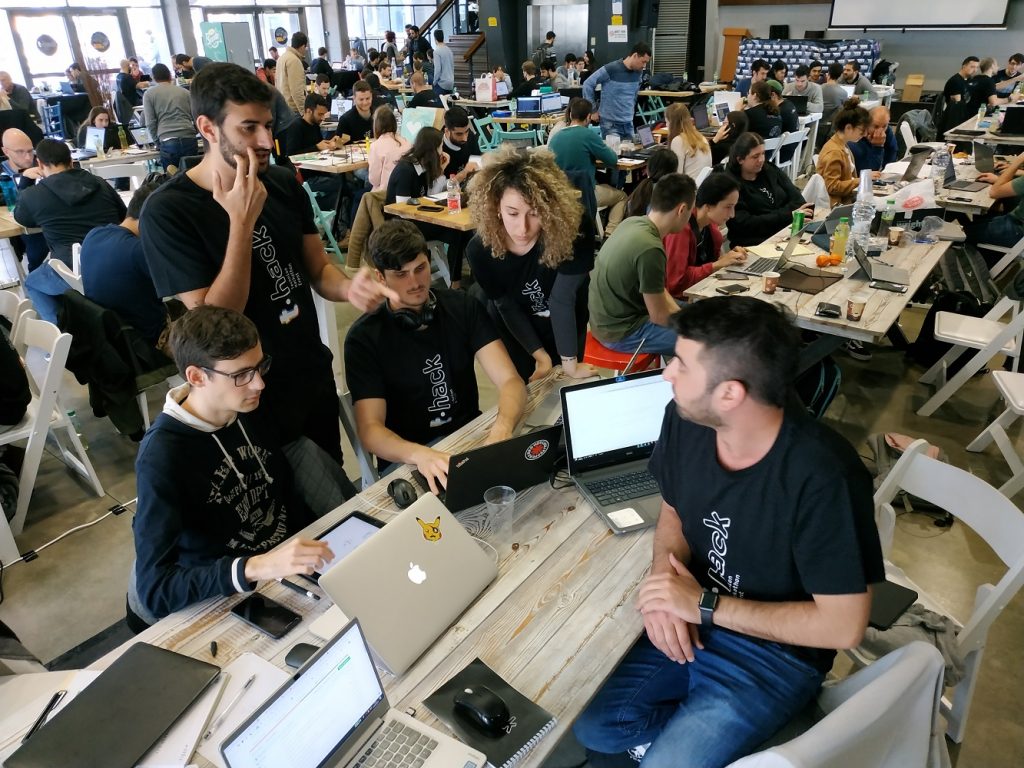How to Organize a Virtual Hackathon
A colleague at Danube University Krems contacted me for adivce on how to organize a virtual hackathon. I have to admit: I know something about digital communication and collaboration, but I have no idea about hackathons in specific. So I digged deeper and did some “investigation”…
Why a Hackathon?
For the Erasmus+ project BioArt, a thematic hackathon should be organized, but researchers didn’t imagine that face-to-face gatherings as well as travelling wouldn’t be possible when writing the project propsal a few years ago.
The idea of BioArt is so establish an innovative curriculum in the field of artificial implants for bio-engineering and this will also be the topic of the hackathon. Students from various countries should solve a problem in this field of work and research. The goal:
- Generating new ideas in the field,
- supporting multidisciplinary work and
- to establish connections and networking among international students.
What is a Hackathon?

This picture was taken at Technion, where one of the biggest students hackaton in Israel takes place. This picture is licensed under the Creative Commons Attribution-Share Alike 4.0 International license, uploaded by ProfNews on 28 March 2019, retrieved on 1 January 2021 on https://commons.wikimedia.org/wiki/File:Technion_Hackathon.jpg
Joshua Tauberer, founder of govtrack.us and very experienced in hackathons, offers a broad definition of “hackathon”:
Hacking is creative problem solving. (It does not have to involve technology.)
A hackathon is any event of any duration where people come together to solve problems. Most hackathons I’ve run also have a parallel track for workshops.
Joshua Tauberer on https://hackathon.guide/, retrieved on 21 January 2021
Hackathons have been widely implemented in software development, but the idea of it has been adopted also to non-technology fields.
The Perfect Lifelong Learning Event
A hackathon definitely supports problem-based learning, the development of disciplinare competences as well as transversal competences like critical thinking, communication skills and teamwork. Several key competenes for lifelong learning are supported and hackathons make it possible to combine learning experiences from higher education, school, work and free time. The perfect lifelong learning event! A nice example is the Openhack Hack4Future 2020 Australia, which supported global collaboration and lifelong learning to solve the following topics:
- innovative solutions for coronavirus spread tracking,
- bushfire risk management and
- smart cities.
You can learn more about the lifelong learning dimension of the hackathon here.
What Makes a Hackathon Successful?
To answer this question, I was reaching out to friends and colleagues. I was looking for people who might already have experience in “traditional” hackathons as well es those, who might have participated in virtual hackathons. First I try so find out, what people motivates to participate at a hackaton in general.
Intrisic Motivation: Relevant Theme and Problems to be Solved
First of all, you need a relevant topic or problem to be solved. It needs to be something, that is interesting for a certain community of practitioners or researchers. To team up with other people you might not know, to give your free time for the hackathon – these are things that you wouldn’t do if the problem doesn’t mean something to you.
Extrinsic Motivation: New Contacts, New Job, Great Prize
Next to the instrinsiv motivation factor like choosing a hackathon theme, also some extrinsic motivational factors are influencing the success of your hackathon. A hackathon is a great chance to network, to be noticed by possible employers or to earn a great prize in case your team wins the hackathon.
Going Virtual with Hackathons
Knowing about the motivational factors, I felt more confident to suggest digital communication and collaboration tools.
A Useful Hackathon-Guide
On https://hackathon.guide/ you can find a comprehensive guide on how to organize a hackathon, but it is referring to “traditional” face-to-face hackathons. Still useful, as many of the aspects mentioned are also important for virtual hackathons. But now to some specifics of the virtual space:
Community Feeling in Virtual Space
Natalie Denk, head of the Center for Applied Game Studies, participated in several hackathons in the past: As “hacker” as well as juror. She underlined that it is important to build a community feeling among participants.
Goodie-bags, sent out to the participants before the start of the hackathon, containing some useful items for the virtual hackathon or some culinary treats, can support the community feeling. These physical items are part of a shared reality among hackathon participants. It can promote commitment and motivation.
Natalie Denk, head of the Center for Applied Game Studies at Danube University Krems
Online White Glove Experience
I also talked to Benjamin Degenhart, who currently works for GovData.de as freelance software engineer. He participated in technology-themed hackathons and especially also at a virtual hackathon. He mentioned, that high profile support by experts in the field is a very valuable resource for participants during the hackathon, a so called “white glove experience”.
It is important to make sure that hackathon participants can get in touch with experts of the field through audio-channels or chatting. There could be dedicated times for exchange and pitching of work-in-progress.
Moderation
One this is for sure: It needs some kind of communication platform. Slack could be used, zoom, discord or similar applications. It needs a good moderator, who can support participants if there are questions and to nourish progress through discussions. Fast feedback to questions is crucial.
Tech Tools to Support the Hackathon
So support group problem-solving in a virtual space as well as to enable the motivational factors to participating in a hackathon, there is usually not one tool or platform that can cover it all. The #WirVsVirus-Hackathon, which was conducted in 2020 to solve various societal problems caused by the Covid19-pandemic in Germany, shared their lessons learned in English language, this is a really great ressource and it also lists the tech tools, they used:
Airtable: Listing curated and clustered challenges
CloudFlare: Website development and design
DevPost: Team registration
Guaana: Challenge submission
Slack: two spaces – one for the hackathon itself and one for the organization team
YouTube: Livestream & announcements (inckl. professional live stream support
Typeform: Registration of participants/challenge owners, mentors and companies
Twitter: Social media communication
Google Hangout and Zoom: Video conference tools for team check-ins
#WirVsVirus Hackathon Handbook, retrieved on 21 February 2021
I have to add at this point: It was a huge hackathon with more 28 000 people participating! A smaller hackathon might not need all of these tech tools, but I strongly recommend:
- Slack or Mattermost as main communication platform and for creating working and sharing spaces
- Video Conferencing Tools: for synchronous group discussions or presentations
What about your Experiences?
Have you participated in an online hackathon? What was good about it? What could be improved? Let me know in the comments!


